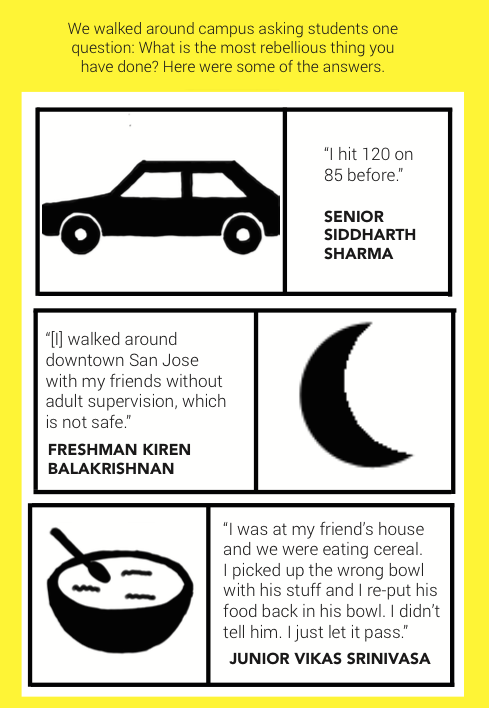hen discussing the topic of this staff editorial, we set out with a mission in mind: don’t perpetuate the stereotype of the overly studious MVHS student. So that’s where the idea of “contra” originated — against the grain, in rebellion to the stereotype attached to us.
For every staff editorial, we gather members from different sections to discuss what topic we should choose. In this particular discussion, the word “rebellion” seemed to spark the fire. It wouldn’t be an exaggeration to say people were yelling at each other, their voices becoming increasingly louder as they passionately voiced their take on the word.
That’s when we realized we had all come to the table with a different image of a rebellion. For some, it’s listening to rap music and throwing around the n-word, while for others it’s a kid who cuts
school, does drugs. For others, it’s simply the one who takes the risk and goes against the grain. The one who refuses to listen to pop music. The one who doesn’t take the SATs. The one who doesn’t wear the latest trends. Whatever our image of a rebel was, we all agreed that rebels were the minority.
 But the word “rebel” is overly stigmatized. The word “rebel” largely has the connotation of party culture.
But the word “rebel” is overly stigmatized. The word “rebel” largely has the connotation of party culture.
It’s
the student whose life revolves around drugs, drinking and sex. But rebellion, by definition, has no implication of embracing a self-indulgent existence which its connotation suggests. The Merriam-Webster dictionary definition simply states that it means “opposition to one in authority or dominance.” In fact, historically speaking, rebellions are events that have brought about change.
The American Revolution created a nation free from British monarchy. The French Revolution caused feudalism to come to an end. The Haitian Revolution gave slaves back their freedom and rights. They are far from being purposeless.
A rebel is simply someone who chooses to be different. They take the risk to go against the norm and try something new. And at MVHS, that norm is our stereotype.
Many MVHS students complain about the label that is automatically given tothem when they enroll into this school. As many students seem to be against this definition that the connotation of being an MVHS student brings us, it’s surprising that we have so few rebels against it. Whatever you think a rebel is, it involves risk. In this environment, that risk might present itself as an academic grade drop, being the outsider in a large school or even just going out of the safety of the Cupertino bubble.
We have been told by countless parents and teachers that MVHS students are not the average teenager. It would be ignorant of us to say that we aren’t privileged. Most of us are able to study and learn in a safe environment without worrying about our families’ financial status. And it’s because of this privilege that we have built up our reputation of being hardworking, academic students. We have invested so much time and effort into our futures that we’re afraid we’ll mess it all up with one wrong move. And it’s not just the burden of self pressure that we carry. Some of our parents have invested their entire lives into providing a good education for us. We don’t want to disappoint them when they’ve done so much on our behalf.
The truth is, most of us don’t rebel because we have too much to lose. At a school where 98 percent of the students are college bound, one mistake could cost us our future. We believe in the domino effect. We think that just one small wrong move, maybe getting an F on a test or cutting a class, could make all the dominos topple down. We’re so focused on the end goal that we mentally create a checklist to become successful. One deviation from that plan and we think our whole world is going to come crashing down. So although we may not like the standard to which MVHS students are held, we’re too afraid to do anything about it. We’re too afraid to become rebels.
While our privilege has given us an abundance of opportunities, it has also taken away our rebellious spirit. We want change, but we don’t have the mindset to do it. Yet the logical way to change the stereotype that so many of us disagree with is to elicit change. We can’t expect change to happen unless we are willing to take the risks to drive those changes. But with our future on a golden pedestal, none of us think we can afford it.
Our teenage years are supposed to be the years when we experiment, find out who we are and try new things. Experiencing these risks is what helps us learn and grow.
The risks we take don’t have to be getting drunk at a party or completely bombing our final. We could take smaller risks, like taking time to rest instead of studying for a quiz tomorrow. Or raising our hand in class even when we’re not 100 percent sure we have the answer. Or asking that girl out for a date. Just small things that go against the mindset of the straightlaced MV student. It’s risks like these that can slowly change our mindset into being more open to taking larger risks.
We’re so afraid of messing up these four years in high school, when we should really be more concerned about them when it really counts: in the adult world. Making mistakes and taking risks in the adult world can have major consequences when it comes to careers. But then again, it’s those who take risks that bring about new technology, come up with new theories and accomplish the impossible. If we don’t start experimenting as teenagers, how will we be able to deviate from the standards of the modern world and bring about something new? We need to start experimenting to learn what kind of risks we should be taking. We need to embrace that rebellious teenage spirit, for ourselves now and in the future. The time to take risks is now.









